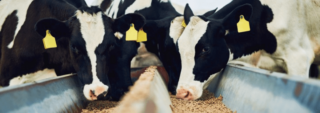- Resources
- Danone commits to cut dairy methane emissions in partnership with farmers and EDF
Resources
Danone commits to cut dairy methane emissions in partnership with farmers and EDF
Published: January 17, 2023 by Katie Anderson
Even if we completely eliminated fossil fuel emissions today, global food system emissions would cause us to exceed our 1.5 degree warming targets, unless they are slowed down. We cannot choose between food security and environmental sustainability – they are one and the same. Urgent action is needed to shift food and agriculture from a driver of climate change and biodiversity loss to a solution, with positive outcomes for producers, companies and consumers.
The good news? The global dairy company Danone is taking a big step forward by pledging to work with its farmer suppliers to reduce methane emissions from its fresh milk supply chain by 30% by 2030.
This announcement builds on past successes, with a plan to accelerate action in the years to come. It aims to achieve significant methane cuts while feeding a growing population and protecting the livelihoods of farmers around the world. And it creates a new level of ambition on methane emissions that I hope others in the food and agriculture industry will follow.
Even a large, global company can’t make this happen by itself. Danone is launching a strategic partnership with Environmental Defense Fund to support its methane reduction ambitions. Danone and EDF will work together in such areas as improved science, data and reporting standards, innovative financing models to help farmers of all sizes, and catalyzing industry and policy leadership through advocacy.
This is the first methane-specific climate pledge from a food or agriculture company. Danone’s size as a major global dairy company provides a significant opportunity for impact.
This is a step-change for the food and agriculture sector – and for the planet
Cutting methane emissions is the most immediate opportunity we have to slow the global warming rate and prevent irreversible damage to the planet. Methane has more than 80 times the warming power of carbon dioxide over the first 20 years after it reaches the atmosphere.
Given its short lifetime in the atmosphere, acting now to reduce methane emissions will provide immediate benefits to the climate that carbon dioxide reductions cannot achieve on their own. For this reason, 150 countries have signed the Global Methane Pledge, agreeing to reduce human-caused methane emissions by 30% by 2030, compared to a 2020 baseline.
Agriculture and livestock account for approximately 40% of human-caused global methane emissions. At the same time, dairy and livestock are key dietary staples around the world and provide livelihoods for millions of farmers. Food and agriculture companies, who rely on these commodities in their supply chains, have been slow to commit to absolute methane reductions – until now.
Danone’s new commitment shows that dairy, which represents an estimated 8% of global human-caused methane emissions, can play a meaningful role in climate action.
A partnership to scale lower-methane dairy
To meet the commitment, Danone and EDF will work together to:
- Accelerate: Danone can only meet this goal if farmers are equipped to lead with flexible solutions that work on farms big and small. Danone will support dairy farmers in its supply chain to reduce methane emissions by deploying already proven practices and technologies, improving herd, feed and manure management to address global and local environmental challenges. Danone has already demonstrated a 14% reduction in absolute methane emissions from 2018 and 2020, with successful projects that have demonstrated benefits for farmers in Africa, the European Union and U.S., while reducing emissions per gallon of milk. Scaling these successes, and finding others, is not only important for climate but will strengthen farm resilience and ensure dairy farming is fit for the future.
- Innovate: New technologies, such as enteric methane inhibiting products, are coming to market, but they need more investment and commercial-scale research to ensure efficacy and safety. Danone and EDF will work together to pilot innovations to cut methane in years to come.
- Advocate: No one company can solve this alone. We also need public policy that supports farmers in the transition to climate-smart agriculture. Other companies and industry allies can join us with strong, methane-specific targets and reporting as part of climate strategies.
The business case of proactive leadership on climate change within the food system, both on methane and beyond, gives companies many compelling reasons to join us. Making food production and land use more sustainable could yield $5.7 trillion in economic benefits and represent a $4.5 trillion annual financial opportunity for businesses by 2030. However, if the world fails to meet climate targets, vulnerable farmers will be left on the frontlines to address increasingly severe floods, droughts and desertification.
Climate change is a serious risk for any company that relies on the wellbeing of farmers and the productivity of agricultural land. Acting to mitigate the risks of climate change is an essential precaution.
Reducing methane emissions is the fastest way to slow global warming in the near term and a critical part of avoiding the worst consequences of climate change by mid-century. It’s the cornerstone of a climate-smart dairy approach that supports farmer and community livelihoods, strengthens soil health, improves biodiversity, protects water and promotes animal welfare. Plus, it’s good for corporate bottom lines and financial futures.
It’s an opportunity we can’t afford to miss.

